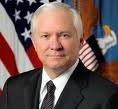
By Nancy A. Youssef and Maggie Bridgeman, McClatchy Newspapers
WASHINGTON — Secretary of Defense Robert Gates said Thursday that a new policy requiring military commanders to get advance clearance from the Pentagon before talking to reporters, is aimed at stopping leaks, not preventing soldiers from talking to the news media.
However, he also acknowledged that he’d learned about key issues, including the poor conditions at Walter Reed Army Medical Center and questions about the safety of a new military vehicle, through news stories that relied on unauthorized interviews and that those leaks “have been a spur to action for me.”
Gates issued to the new media policy last week in the wake of the dismissal of Army Gen. Stanley McChrystal as commander of U.S. forces in Afghanistan after McChrystal and his aides were quoted in an article in Rolling Stone magazine making derogatory comments about top civilian leaders.
The July 2 memo ordered commanders and their public affairs officers to seek Pentagon approval for interviews. McChrystal’s civilian public affairs adviser resigned over the Rolling Stone interview before his boss was fired.
“I have grown increasingly concerned that we have become too lax, disorganized, and, in some cases, flat-out sloppy in the way we engage with the press,” Gates said. “So this is more about our being more intelligent and thoughtful about how we respond to requests for interviews and to try and make sure that the information you’re getting is accurate, as well as making sure that our people aren’t speaking out about issues where they may be treading on sensitive ground and not even know it.”
In the two-page memo, which was leaked Friday to the New York Times , Gates wrote: “Prior to interviews or any other means of media and public engagement with possible national or international implications, all component leaders or their public affairs officials must notify OSD ( Office of the Secretary of Defense ) Public Affairs which, in turn an as appropriate, will ensure that senior Department officials with the relevant overall knowledge and situational awareness have been consulted.”
Gates, who also served in President George W. Bush’s Cabinet, said both Bush and President Barack Obama have complained about defense officials “speaking out inappropriately on foreign-policy issues.”
“My hope and expectation is that this new guidance will improve the quality of press engagement by ensuring that the people the media talk to can speak with accuracy and authority,” Gates said.
Reporters covering the Pentagon worried that the memo was too vague to understand and would have a “chilling effect” their efforts to report on the Pentagon and wars in Iraq and Afghanistan . Some officials told McClatchy they don’t know whether they’re allowed to speak to reporters anymore.
Others worried the Pentagon was trying to censor embarrassing information. Asked whether the Pentagon would have banned McChrystal from speaking to Rolling Stone, Adm. Mike Mullen , the chairman of the Joint Chiefs of Staff, said that’s an easy call to make in hindsight.
Alan Bjerga , the president of the National Press Club , said that rather than lead to more accurate information, the new policy is likely to produce only Pentagon -approved news.
“It’s a matter of control,” Bjerga said. “The question then is what interest is served by” the memo.
It remains unclear whether the memo will having a lasting impact. When asked for his reaction to seeing his memo leaked to a newspaper last week, Gates said: “It was highly predictable.”
ATTENTION READERS
We See The World From All Sides and Want YOU To Be Fully InformedIn fact, intentional disinformation is a disgraceful scourge in media today. So to assuage any possible errant incorrect information posted herein, we strongly encourage you to seek corroboration from other non-VT sources before forming an educated opinion.
About VT - Policies & Disclosures - Comment Policy



